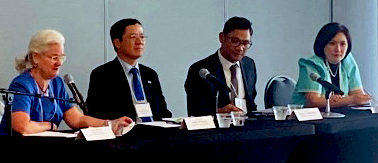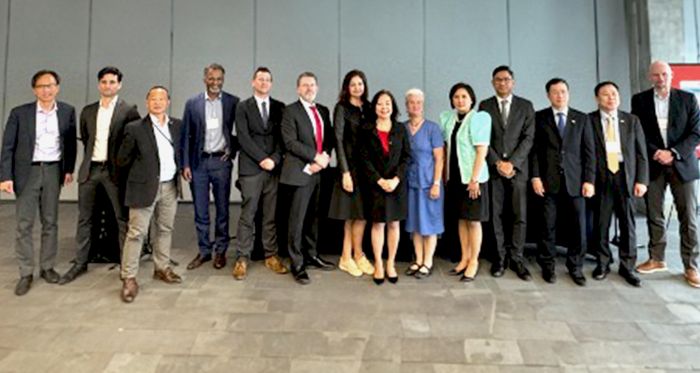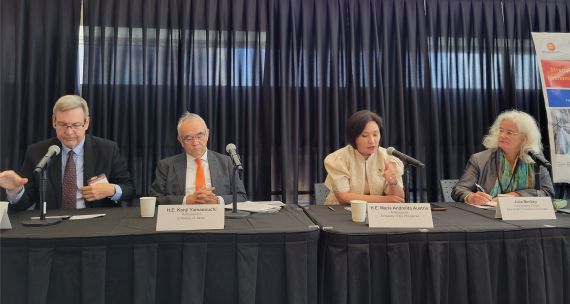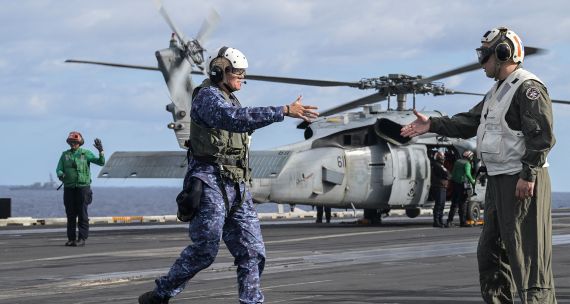The ‘Building on Canada-ASEAN Security Co-operation’ symposium, hosted by the York Centre for Asian Research’s Canada-ASEAN Initiatives, in collaboration with the Asia Pacific Foundation of Canada and Global Affairs Canada, brought together stakeholders from the Canadian federal government, think-tanks, the Canadian military, and Canadian universities, as well as ambassadors from three Southeast Asia countries to discuss how to build security co-operation between Canada and the Association for Southeast Asian Nations (ASEAN).
Highlights from the discussion at Carleton University in Ottawa on May 13, 2024, are summarized below.
Canada and ASEAN have parallel priorities in Southeast Asia
There is considerable synergy between Canada’s priorities, as articulated in its 2022 Indo-Pacific Strategy, and ASEAN’s Outlook on the Indo-Pacific. These include promoting regional peace, resilience, and security; maintaining open, rules-based trade and economic integration; fostering connectivity and sustainable development; and taking an inclusive approach to regionalism.
The security environment in Southeast Asia is dynamic and complex, with the region’s states facing great power competition and related geopolitical tensions. These issues are not only challenging regional stability but also testing ASEAN’s leadership. As economic security is paramount for ASEAN partners, they need to simultaneously balance, hedge, and bandwagon in the face of these rising tensions.

But ASEAN’s approach to security is also comprehensive and holistic, and some key areas on which it would welcome further collaboration include maritime security, food security, energy security, cybersecurity, knowledge exchange related to and protection of critical infrastructure, and humanitarian and disaster relief.
To ensure that its priorities in Southeast Asia remain aligned with those of ASEAN, Canada recognizes that it needs to take a nuanced and collaborative approach. To that end, some of its recent security co-operation initiatives with ASEAN and its member states have focused on naval deployments, disaster response, fisheries, biodiversity, biosecurity, cybersecurity, border management, and the assignment of additional Canadian defence advisors and Canadian cyber attaches to Canadian diplomatic missions in Southeast Asia.
Imperatives of security and the rule of law in the South China Sea
The South China Sea was described by symposium participants as the fulcrum on which regional security depends and an area of tremendous economic importance – one-third of all global trade, worth more than C$4.6 trillion annually, passes through the South China Sea.
From a legal perspective, the Hague Tribunal’s 2016 ruling on the South China Sea in favour of the Philippines was based on facts and science rather than geopolitics. While ASEAN members have made some efforts to develop a regional Code of Conduct, their relative lack of progress reflects their limited capacity to promote a rules-based international order in the South China Sea.
To help maintain maritime stability, defence agreements and information-sharing arrangements were mentioned by participants as important steps Canada could take in engaging with Southeast Asian countries. Canada has also increased its naval presence in the region by annually deploying three Canadian vessels and participating in joint exercises, underlining the value of greater interoperability and forging partnerships with industry on surveillance technology and data analysis.
Two non-military Canadian initiatives that will benefit Southeast Asian partners are 1) the Shared Oceans Fund, an IPS commitment of more than C$84 million over five years to “support ocean management, reinforce a healthy marine environment,” and enhance “measures against illegal, unreported, and unregulated (IUU) fishing” in the region; and 2) Canada’s Dark Vessel Detection Program, including its innovative approaches and objectives in co-operating with ASEAN in tackling IUU fisheries and promoting rules-based international law in the South China Sea.
In addition, panellists noted the importance of enforcement patrols on the high seas, aerial surveillance, and pooling legal expertise and reporting mechanisms to prevent a convergence of organized crime and human slavery at sea. Partnerships between state and non-state actors can increase transparency in IUU, for example, to analyze fisheries intelligence from satellites. Closer collaboration with the defence industry could advance Canada-ASEAN maritime security co-operation, for instance in capacity-building related to intelligence, surveillance, and reconnaissance.
Ideas for enhancing Canada’s “invisible footprint” in Southeast Asia
Engaging Southeast Asia means more than providing assistance; it requires listening to ASEAN voices to ensure that both sides benefit from well-calibrated co-operation, including on strategic and economic matters. For example, Canada could provide scholarships to Southeast Asians to help the region build its capacity in areas such as marine science and maritime law. That would constitute a positive Canadian contribution to issues related to the South China Sea.
In addition, ASEAN countries receive mixed signals about Canada, hearing one thing from government statements and another in media commentary. As Canada implements its IPS, Southeast Asians will be watching for genuine, sustained commitment, proactivity, and sensitivity to the ASEAN mindset of consensus-building.
Canada should not be too obsessed with its aspiration to join the ASEAN Defense Ministers Meeting Plus (ADMM+) grouping; rather, it should capitalize, where possible, on its observer status within that body (if granted), and its working groups, to pursue other platforms for security engagement with ASEAN. This could mean exploring how trilateral and mini-lateral bodies could contribute to regional security co-operation. One panellist also proposed that Canada consider having a dedicated Indo-Pacific security envoy appointed to the region.
Canada should also differentiate its positions from those of the U.S. For example, Canada, unlike the U.S., is a member of the Comprehensive and Progressive Agreement for Trans-Pacific Partnership (CPTPP), of which four ASEAN members (Brunei, Malaysia, Singapore and Vietnam are also members, and others (Indonesia and Thailand) have indicated an interest in joining.
It was also suggested that Canada partner with others outside the region (such as Japan and South Korea) who are deepening their engagement with Southeast Asia on trade, technology, and security, and doing so in response to Southeast Asian interests.
In conclusion, the symposium spotlighted the critical role of enhanced Canada-ASEAN co-operation to promote security and the rule of law in the Indo-Pacific. The alignment of implementation between Canada's Indo-Pacific Strategy and ASEAN’s Outlook on the Indo-Pacific – along with other ways to promote greater stability in the South China Sea – can open new avenues for growth and collaboration. Participants appreciated the opportunity to compare and contrast the views of representatives from different government departments, from academics and three Southeast Asian ambassadors. They welcomed the prospect of a second such symposium on Canada-ASEAN security co-operation in future.
• Author Julia Bentley produced this summary report in consultation with Dr. Julie Nguyen, Chair of Canada-ASEAN Initiatives, York Centre for Asian Research at York University, and a co-founder and director of the Canada-Vietnam Trade Council. Zhi Ming Sim (PhD Candidate, Political Science, York University) and Je Ho Cho ( MA Student in International Affairs, Norman Paterson School of International Affairs, Carleton University) contributed to this report.





